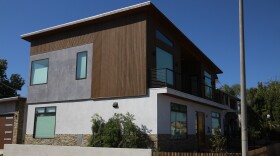The town of Jena, La., is coping with a case of racially motivated violence, even as court proceedings against those involved move forward. The case, centering on a tree at a high school campus that was a favorite meeting place for white students, has exposed racial tensions in the small town.
Earlier this week, a judge threw out one of the two charges against the first black student tried for beating up a white student at Jena High School, saying juveniles cannot be charged with conspiracy in adult court.
But Judge J.P. Mauffray Jr. rejected arguments that, for the same reason, he should throw out the aggravated second-degree battery charge on which Mychal Bell also was convicted. The judge's decision means Bell will face at most 15 years in prison, rather than 22.5, when he is sentenced Sept. 20.
The case's beginnings can be traced to a day when a black freshman student at Jena High asked the principal at an assembly if he could sit under a courtyard tree that was known traditionally as a white student hangout. Shortly afterward, three nooses were found hanging from the tree.
That sparked a series of racially charged events, culminating in a schoolyard attack of a white student and the arrest of six black teenagers for the crime.
"The mood of Jena is very, very bad," said the Rev. Brian Moran, pastor of Antioch Baptist Church in Jena.
Noting that the black students who sat under the tree had asked the principal's permission to do so, Moran said that immediately after they sat there, the nooses appeared.
"It really confuses me why anybody would say that this is not a racist situation," Moran said.
Students accused of placing the nooses on the tree were suspended from school for a short period.
Pastor Eddie Thompson of the Sanctuary Family Worship Center in Jena said national news coverage of the case has led many other white ministers to avoid speaking to the media.
"Their small Southern town has kind of been offered up as a sacrifice for America's national sin," Thompson said.
He said he believes prejudice and bigotry exists in his community and elsewhere in the United States, but "the people are seeing their town portrayed in a way in the national media that is foreign to them, completely."
Moran and Thompson agree that the community's ministers should have maintained a sense of unity regarding the case. Instead, as details of the case emerged and opinions became more enflamed, an initial attempt at an alliance failed.
"Until the trials are settled, there's not going to be much of an opportunity for us to move forward," Thompson said.
The Jena school case drew protests after five of the six teens, dubbed the "Jena Six," were originally charged with attempted second-degree murder and conspiracy to commit murder, carrying sentences of up to 80 years in prison. The sixth was charged in juvenile court.
The beating victim, Justin Barker, 18, was treated for injuries at a hospital and released the same day, and a motive for the alleged Dec. 4 attack at the high school was never established.
Bell was the first of six teens to go to trial. The attempted murder charges were reduced to aggravated second-degree battery and conspiracy to commit aggravated battery, and Bell was convicted.
But Mauffray threw out the conspiracy conviction Tuesday, saying juveniles could not be charged with conspiracy in adult court.
Both sides said they would appeal. Bell's attorneys want the battery charge throw out, as well, and the case returned to juvenile court.
The charges against two of the other teens, Carwin Jones and Theo Shaw, also were reduced Tuesday from attempted second-degree murder to aggravated second-degree battery and conspiracy. Robert Bailey Jr. and Bryant Purvis still face attempted murder charges, and the unidentified juvenile has yet to go to trial.
Text from NPR reports and The Associated Press
Copyright 2022 NPR. To see more, visit https://www.npr.org. 9(MDAzMjM2NDYzMDEyMzc1Njk5NjAxNzY3OQ001))





